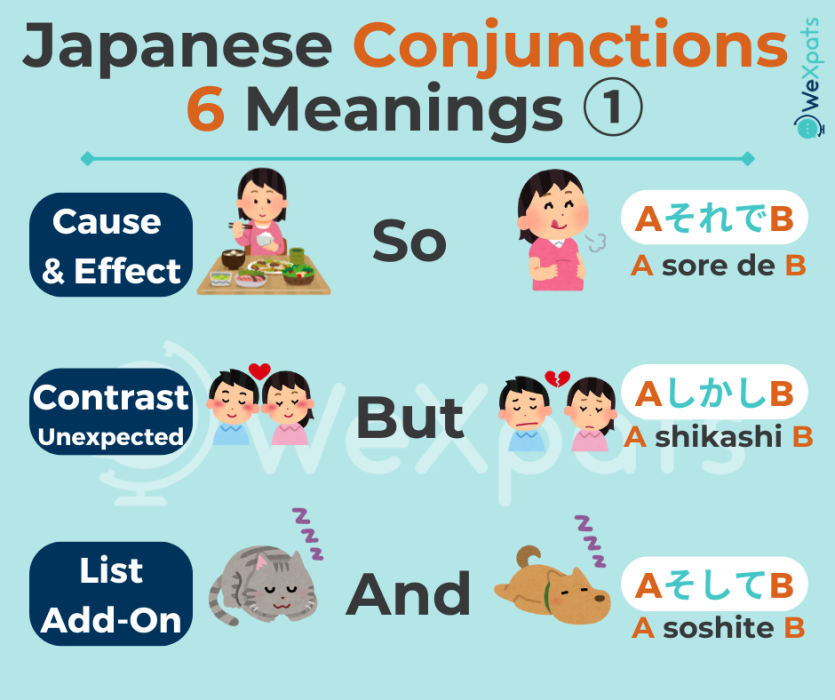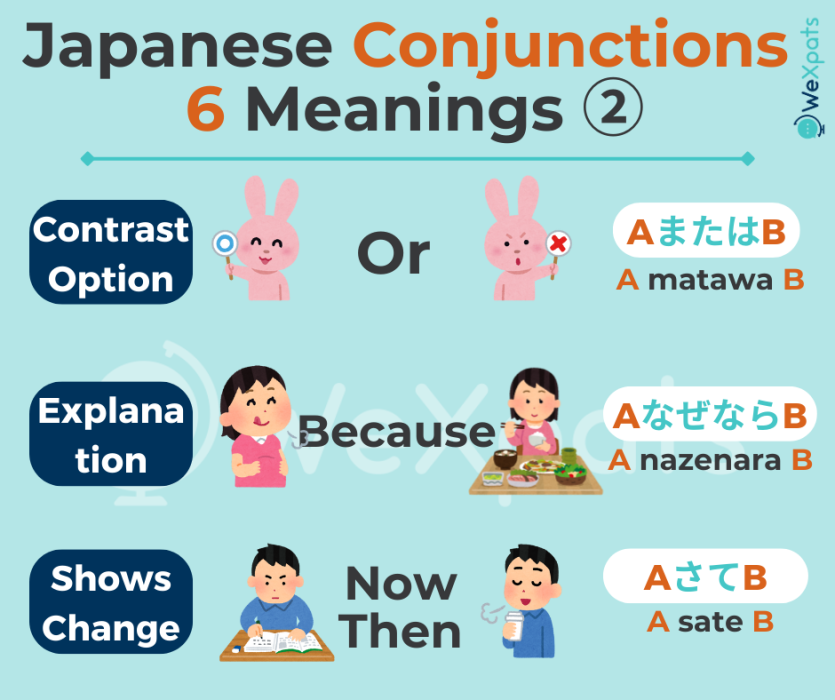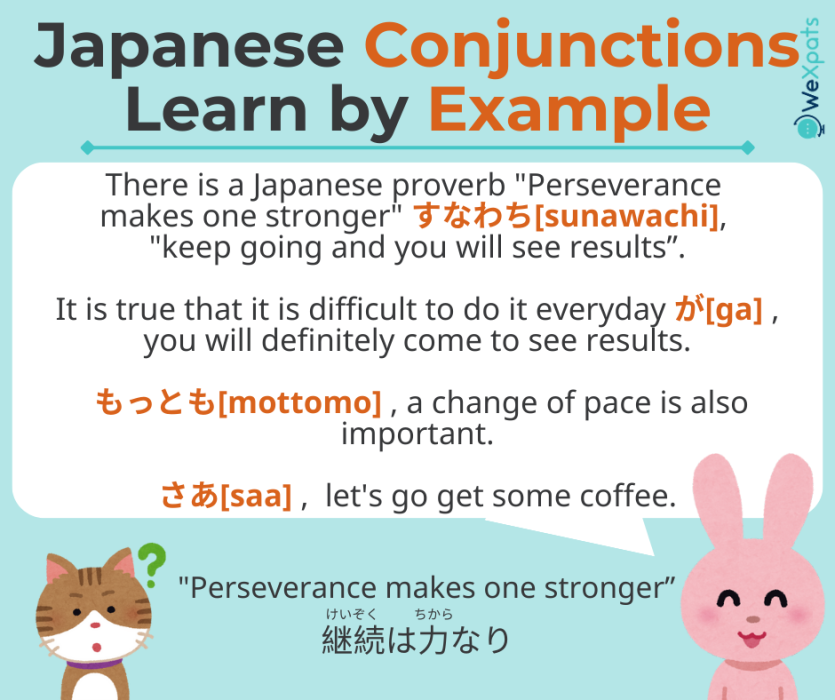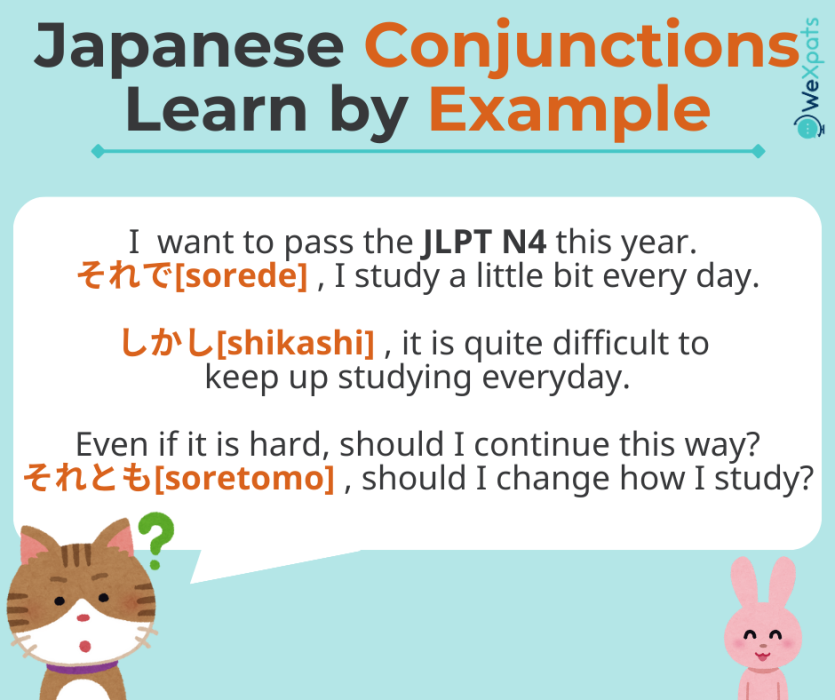After you can construct simple sentences, it is time to make longer ones by making use of conjunctions. We have compiled a total of 100 Japanese conjunctions spanning from JLPT N5 to N1 levels. Jump to your level to see what you need to prepare for the JPT exam.
Table of Contents
- What are Japanese conjunctions?
- 6 Categories (Meanings) of Japanese Conjunctions
- Conjunctive Particles and Conjunctions
- JLPT Conjunctions List 100 : From N5 to N1
What are Japanese conjunctions (接続詞)?
Conjunctions (接続詞; せつぞくし; setsuzokushi) are words that “connect” the contents of front and back sentences to each other. Conjunctions can be used alone, and are not conjugated like verbs or adjectives.
Conjunctions create a connection between 2 separate sentences, or connect the front and back contents within the same sentence.
1. Sentence and Sentence :
[Sentence A]. [Conjunction] (,) [Sentence B].
Example) 昨日は寒かった。が、今日は暑い。
(kinou wa samukatta. ga, kyou wa atsui.)
- Yesterday was cold. But, today is hot.
2. Linking Elements within a Sentence
Example) ファックスもしくはメールで送ってください。
(fakkusu moshikuwa meeru de okutte kudasai)
- Please send it by fax or email.
In the above examples, 「が」and 「もしくは」are conjunctions.
Writer's Pick
6 Categories (Meanings) of Japanese Conjunctions


Japanese conjunctions can be broadly classified according to their meaning. It is a good idea to group conjunctions that have the same meaning together, and memorise them.
1) Conjunction to Express Cause and Effect :
[Sentence A] + [Conjunction] + [Sentence B] = [Sentence B = natural result of A]
Example) それで (sorede), だから (dakara)
English Equivalent / Similar Phrases : “Because”, “Therefore”, “For that Reason”, “So”
2) Conjunction to Show Contrast :
[Sentence A] + [Conjunction] + [Sentence B] = [Sentence B = unexpected result of A]
Example) しかし (shikashi), でも (demo)
English Equivalent / Similar Phrases : “Although”, “Even Though”, “But”
3) Conjunction to Express Supplementary Information :
[Sentence A] + [Conjunction] + [Sentence B] = [Sentence B = add-on content after A]
Example) そして (soshite), なお (nao)
English Equivalent / Similar Phrases : “Furthermore”, “In Addition”, “And Then”
4) Conjunction to Express Option or Contrast :
[Sentence A] + [Conjunction] + [Sentence B] = [Sentence B = another option from A]
Example) または (matawa), それとも (soretomo), あるいは(aruiwa)
English Equivalent / Similar Phrases : “Or”, “Either…or…”
5) Conjunction to Explain, Give Reasons :
[Sentence A] + [Conjunction] + [Sentence B] = [Sentence B = reason for A, supplementary explanation for A]
Example) なぜなら (nazenara), すなわち (sunawachi), もっとも (mottomo)
English Equivalent / Similar Phrases : “In Other Words”, “Because”, “Due To”
6) Conjunction to Show a Change in Situation :
[Sentence A] + [Conjunction] + [Sentence B] = [Sentence B = situation changed from A]
Example) さて (sate), じゃあ (jyaa), さあ (saa)
English Equivalent / Similar Phrases : “Well Then”, “So Then”
Japanese Conjunctions are Easy to Study with Example Sentences
Let’s see how Japanese conjunctions are used through examples.


猫さん (Neko-san) :
今年はJLPT N4に合格したいです。それで (sorede)、毎日少しずつ勉強しています。
(kotoshi wa JLPT N4 ni gougakushitaidesu. sorede, mainichi sukoshizutsu benkyoushiteimasu.)
しかし (shikashi)、毎日勉強を続けるのはなかなか難しいです。
(shikashi, mainichi benkyou wo tsudukeru nowa nakanaka muzukashii desu.)
難しくても、このまま続けたほうがいいですか?それとも (soretomo)、
勉強方法を変えたほうがいいですか?
(muzukashikutemo, konomama tsuzuketa houga ii desuka?
soretomo, benkyou houhou o kaeta houga ii desuka?)
ウサギさん (Usagi-san):
「継続は力なり」すなわち (sunawachi)、
「続けると成果が得られる」という日本のことわざがあります。
(「keizoku wa chikara nari」sunawachi,
「tsuzukeru to seika ga erareru」toiu nihon no kotowaza ga arimasu.)
毎日続けることはたしかに難しいですが (ga)、
いつか必ず効果が出ます。
(mainichi tsuzukeru koto wa tashikani muzukashii desuga,
itsuka kanarazu kouka ga demasu.)
もっとも (mottomo)、気分転換も大切です。
(mottomo, kibun-tenkan mo taisetsu desu.)
さあ (saa)、コーヒーを買いに行きましょう。
(saa, koohii o kai ni ikimashou.)
Conjunctive Particles (接続助詞) and Conjunctions (接続詞)
As mentioned above, ”Conjunctions (接続詞; せつぞくし; setsuzokushi)” can be used alone. On the other hand, there is also “conjunctive particles (接続助詞; せつぞくじょし; setsuzokujoshi)” that cannot be used alone, but is attached to the end of a noun or verb/adjective to act as a connection (conjunction).
Unlike Conjunctions (接続詞), Conjunctive Particles (接続助詞) by themselves have no particular meaning. They only gain meaning when attached to a noun/verb or adjective. This is quite difficult to understand, so here’s an example using the conjunctive particle 「から (kara)」that is used to express “reason”.
Example) 今行くから少し待ってて。(ima iku kara sukoshi mattete.) - I’ll go right now so wait up.
In the above sentence, the conjunctive particle (接続助詞)「から」is attached to the verb 「行く」to form the phrase「行くから」(iku kara) - go + so. (Unfortunately, the meaning does not really carry across in English and only makes sense in a full sentence.)
JLPT Conjunctions List 100 : From N5 to N1
We have compiled the Japanese Conjunctions that you need to study for JLPT N5~N1. They total 100!
Knowing how to use these conjunctions will greatly improve your grammar skills. Go through them slowly!
Note: For studying purposes, Kanji will be indicated for conjunctions that contain Kanji characters at the relevant JLPT level. However, conjunctions are generally written in Hiragana characters.
JLPT Conjunctions List N5
|
でも |
but; however; though |
|
|
が |
but; however |
|
|
じゃあ |
then; well; so then |
|
|
~か~か |
or |
|
|
~から |
~because |
|
|
けど |
~but; ~however |
|
|
けれども |
but; however; although~ |
|
|
~ので |
~because of; given that~; that is why~ |
|
|
さあ |
well… (situation change) |
|
|
しかし |
but; however~ |
|
|
それから |
and then; after that; so after that |
|
|
そして |
and; and then; thus; and now~ |
JLPT Conjunctions List N4
|
これから |
from now on; in future; after this |
|
|---|---|---|
|
または matawa |
or; either~or~ |
|
|
なら |
if~;if that’s the case; if so |
|
|
~のに |
even though~; despite; although |
|
|
~し |
~and; not only (emphasis) |
|
|
それで |
so; therefore~ |
|
|
それでも |
nonetheless; even so; and yet~; |
|
|
それに |
in addition to~; moreover~; |
|
|
~たら |
~if; when; after |
|
|
~たらどう |
How about~? |
|
|
~たらいいですか |
Can I~? |
|
|
~て / ~で |
because of~; A so B |
|
|
~と |
when |
|
|
~といってもいい |
~と言ってもいい |
you could say; it can be said that |
JLPT Conjunctions List N3
|
~ばいい |
should; it’d be good if~ |
|
|
だけど |
but; however |
|
|
かわりに |
代わりに |
instead of; as a substitute for~; |
|
~ことは~が |
although~; but~ |
|
|
~くせに |
~and yet; though; in spite of |
|
|
~も~ば~も |
~and ~but ~and; either~or~; |
|
|
もしも〜たら |
supposing~then; if~then |
|
|
なぜなら |
because |
|
|
~につれて |
in accordance with; in proportion to; |
|
|
さらに |
again; furthermore |
|
|
さて |
now then~ (change topic); |
|
|
そのために |
hence; for that reason |
|
|
それとも |
otherwise; or |
|
|
すなわち |
that is to say; namely; in other words |
|
|
ために |
because of~; as a result of~; |
|
|
たとえば |
例えば |
for example |
|
~といい |
I wish I could; it would be nice if~ |
|
|
といっても |
と言っても |
even so; even if~; |
|
というのは |
と言うのは |
this means~; because~; |
|
~というと |
~と言うと |
when it comes to~; |
|
~とすれば ~としたら ~とすると |
in the case of~; so~; then~ |
JLPT Conjunctions List N2
|
あるいは |
or; either~or~ |
|
|
ちなみに |
by the way; incidentally |
|
|
だって |
but; because |
|
|
いっぽうで |
一方で |
on one hand; on the other hand |
|
~かとおもったら |
~かと思ったら |
just when~; no sooner than |
|
~くせして |
despite the fact that~; even though; |
|
|
~ものだから |
so; therefore |
|
|
もっとも |
even so~; although; though~ |
|
|
なお |
furthermore; in addition; moreover; note that~ |
|
|
~にかぎらず |
~に限らず |
not limited to; not just~; not only~but also; |
|
~にもかかわらず |
~にも関わらず |
despite; in spite of; even though~; no matter |
|
おまけに |
on top of that; to make things worse; |
|
|
および |
及び |
and; as well as |
|
しかも |
moreover; furthermore; nevertheless; |
|
|
そこで |
其処で |
so (continue from the front); |
|
そのうえ |
その上 |
besides; in addition; furthermore~ |
|
それなのに |
and yet~; despite that |
|
|
それなら |
in that case; if that’s the case; if so~ |
|
|
~てでも |
even if~ |
|
|
~とどうじに |
~と同時に |
~at the same time; while at it |
|
~といった |
such as; like |
|
|
~とか(で) |
apparently~ |
JLPT Conjunctions List N1
|
~ばこそ |
~only because |
|
|
~ばそれまでだ ~たらそれまでだ |
if~then it’s over; if~cannot be helped |
|
|
~べく |
in order to; for the purpose of |
|
|
~べくして |
as a natural result: ~bound to happen |
|
|
~であれ ~であろうと |
even~; whoever/whatever/however |
|
|
~であれ~であれ |
or; either~or |
|
|
いずれにしても いずれにしろ いずれにせよ |
anyway; anyhow; either way |
|
|
~かとおもいきや |
~かと思いきや |
so I thought but~ |
|
~かいもなく |
~甲斐もなく |
in vain; despite |
|
かたがた |
at the same time; incidentally |
|
|
~こそあれ |
although |
|
|
~こそすれ |
and; although; but |
|
|
~こそ~が ~こそ~けれど |
but; although |
|
|
~こととて |
because |
|
|
~もので |
because; for that reason |
|
|
もしくは |
若しくは |
or |
|
~ながらに |
while; during; |
|
|
~ならいざしらず ~はいざしらず |
I don’t know about ~ but |
|
|
~にあって |
at / in / during |
|
|
~にいたっても |
~に至っても |
even if it reaches the point of~ |
|
~にしたところで ~としたところで |
even if; even supposing that |
|
|
~たところで |
no matter the situation; even if |
|
|
~たらさいご ~たがさいご |
~たら最後 ~たが最後 |
if you do~ |
|
~たら~たで |
if / in the case~ of course / should ~ |
|
|
~たら~ところだ |
if (assumed) ~ then |
|
|
~とあれば |
if (situation) is the case |
|
|
~とあって |
due to the fact that |
|
|
~といえども |
even if; despite |
|
|
~というか~というか |
rather; or perhaps I should say; |
|
|
~ときている(から) |
because of~ |
|
|
となると となれば |
when it comes to; if so |


































